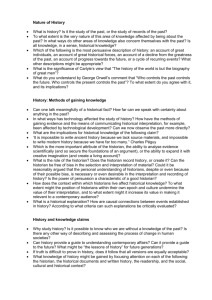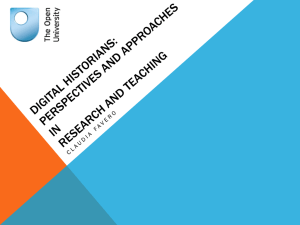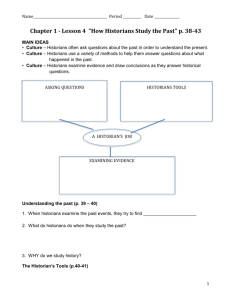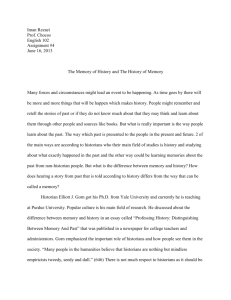historians buried
advertisement
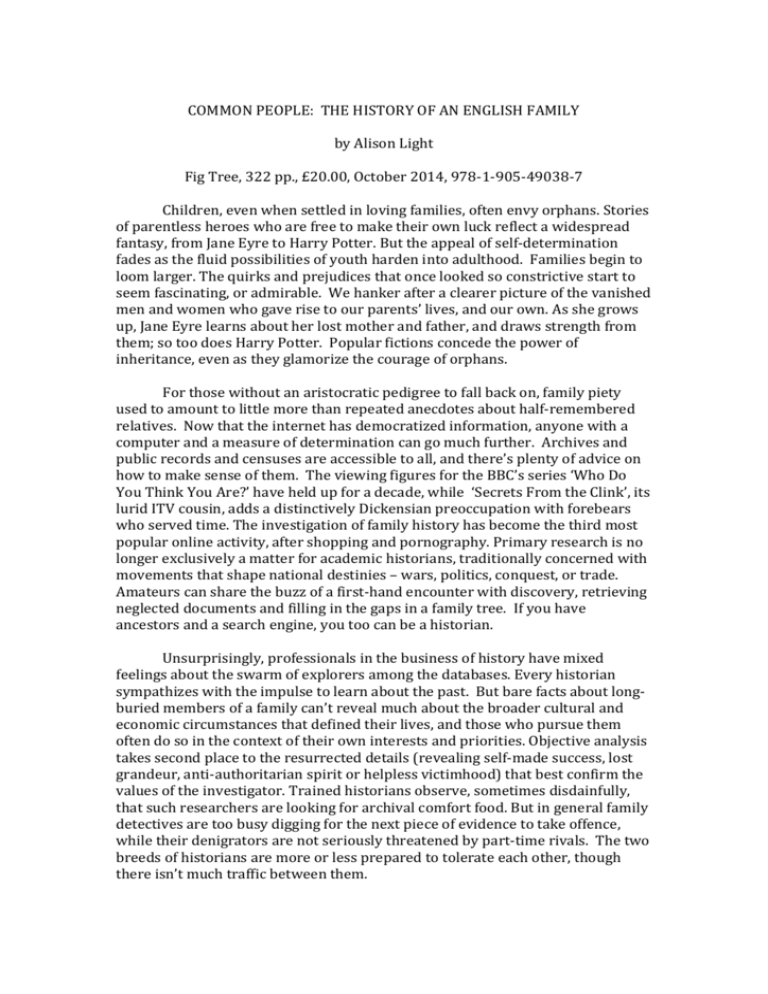
COMMON PEOPLE: THE HISTORY OF AN ENGLISH FAMILY by Alison Light Fig Tree, 322 pp., £20.00, October 2014, 978-1-905-49038-7 Children, even when settled in loving families, often envy orphans. Stories of parentless heroes who are free to make their own luck reflect a widespread fantasy, from Jane Eyre to Harry Potter. But the appeal of self-determination fades as the fluid possibilities of youth harden into adulthood. Families begin to loom larger. The quirks and prejudices that once looked so constrictive start to seem fascinating, or admirable. We hanker after a clearer picture of the vanished men and women who gave rise to our parents’ lives, and our own. As she grows up, Jane Eyre learns about her lost mother and father, and draws strength from them; so too does Harry Potter. Popular fictions concede the power of inheritance, even as they glamorize the courage of orphans. For those without an aristocratic pedigree to fall back on, family piety used to amount to little more than repeated anecdotes about half-remembered relatives. Now that the internet has democratized information, anyone with a computer and a measure of determination can go much further. Archives and public records and censuses are accessible to all, and there’s plenty of advice on how to make sense of them. The viewing figures for the BBC’s series ‘Who Do You Think You Are?’ have held up for a decade, while ‘Secrets From the Clink’, its lurid ITV cousin, adds a distinctively Dickensian preoccupation with forebears who served time. The investigation of family history has become the third most popular online activity, after shopping and pornography. Primary research is no longer exclusively a matter for academic historians, traditionally concerned with movements that shape national destinies – wars, politics, conquest, or trade. Amateurs can share the buzz of a first-hand encounter with discovery, retrieving neglected documents and filling in the gaps in a family tree. If you have ancestors and a search engine, you too can be a historian. Unsurprisingly, professionals in the business of history have mixed feelings about the swarm of explorers among the databases. Every historian sympathizes with the impulse to learn about the past. But bare facts about longburied members of a family can’t reveal much about the broader cultural and economic circumstances that defined their lives, and those who pursue them often do so in the context of their own interests and priorities. Objective analysis takes second place to the resurrected details (revealing self-made success, lost grandeur, anti-authoritarian spirit or helpless victimhood) that best confirm the values of the investigator. Trained historians observe, sometimes disdainfully, that such researchers are looking for archival comfort food. But in general family detectives are too busy digging for the next piece of evidence to take offence, while their denigrators are not seriously threatened by part-time rivals. The two breeds of historians are more or less prepared to tolerate each other, though there isn’t much traffic between them. In choosing to write the history of an English family - her own family, in fact - Alison Light makes a determined if somewhat uneasy effort to bridge this gap. Painfully aware of the hazards, she repeatedly attempts to disarm the criticism, or self-criticism, that is an inevitable consequence of her project. Is the turn to family history symptomatic of a defeated and fragmented culture, in helpless retreat from a disempowering future? Does it reflect contemporary conservatism, evading the challenges of social and political reform? Light insists that her version of family history will not be myopic, but will concern itself with ‘big questions about economic forces, political decisions, local government, urban history, social policy, as well as the character of individuals and the fate of their families.’ Her account will provide, she explains, something other than the inward-facing assemblage of disconnected biographical facts that will satisfy most family historians. It will serve as a model for a more sceptically questioning pattern of investigation. And perhaps it will, for this very self-aware book has much more intellectual energy than most representatives of its genre, and it is directed at a more knowing readership. Yet Light’s project has, as she acknowledges, entirely conventional origins. It was triggered, like many such ventures, by illness - the cancer that struck down her father, when she was in her mid-fifties. The work began with the wish to retrieve the past at the moment of its disappearance, as ‘memory and history seemed to be ebbing away’. Light’s book is also personal in its unremitting emphasis on the lives of the disregarded and dispossessed. Most family historians make trips to churchyards and cemeteries, and Light begins her search in traditional fashion, looking for the grave of her grandmother, Evelyn Light, in Brandwood End Cemetery, a public burial ground in Birmingham. What she finds is a ‘stretch of bare grass over the common graves’. There had been no money for an individual plot, identified by a headstone. ‘She was a nobody … I should have realized, I thought angrily, that people like us, common people, would be in common graves.’ Here is a bleak setting for the book’s title – ‘Common People’, undistinguished and vulgar. The anger is predictable, given Light’s sturdy socialism, and her inclination, memorably expressed in Mrs Woolf and the Servants (2007), to focus on those who are customarily overlooked. This is history with a political purpose, claiming to be exceptional in its defence of the unexceptional, as a counterblast to the air-brushed elegance of period film and television. For most of our dead forebears, workhouses, prisons or asylums were more likely to have provided a bed than any picturesque version of Downton Abbey. In a later chapter, Light maintains that there is no point in returning to the past if the result is only an ‘amorphous pity’. The anger that she felt as she stood in Brandwood End Cemetery, she tells us, is ‘more bracing’. Yet this book was not written in a spirit of outrage. A persistent mourning for people who lived in conditions of constant struggle washes over Light’s indignation at the odds that were stacked against them. The only ancestral home she wants to identify is the workhouse, the institution which haunts this book. Her greatgrandmother, Sarah Hill, is a pitiful representative of the poor who travel through her reconstructions of the past. The daughter of an unmarried and destitute servant girl, Sarah spent the first eight years of her life in the Cheltenham workhouse where she was born. She was not the kind of fictional orphan who could transcend the forlorn circumstances of her childhood. Yet she survived, as many of her fellow inmates did not, and was eventually rescued by her grandmother. She was taken to Wales, and became, like her mother, a domestic servant. Later she married a farm carter. Perhaps her early privations had damaged her health, mental and physical. In 1911 she was admitted to Netherne County Asylum, a vast public institution for the insane, where she was to die of ‘exhaustion’ after a few days of mania. She was fifty-three years old. This is an unhappy story. And yet nothing can be known of Sarah’s personality, or how she felt about her origins in the workhouse. Was she ashamed, resentful, or resigned? Or grateful for better times, and irrepressibly cheerful? She had, after all, become a wife, and the mother of two girls and a boy. Perhaps she achieved a level of contentment that made her grim start seem irrelevant. Her final days were desperate, but, as Light observes, the ‘ending is not the most important part of a life’. Only the scantiest facts about Sarah’s experiences survive; bolstered, in Light’s narrative, by a barrage of information about the iniquities of the workhouse system, in Cheltenham and elsewhere. ‘She was a nobody who had left nothing behind except her children’, Light remarks, echoing her bitter comment on the anonymity that had swallowed up Evelyn, her grandmother. Given the passing of sufficient years, that’s an observation that will apply to most of us. Light concentrates on nineteenth and early twentieth-century lives, as genealogists usually do, busily listing names and networks, and presenting what information can be recovered about their tribulations and (more rarely) triumphs as they slid into destitution or clambered into respectability. But her forebears were for the most part poor, and poverty doesn’t bequeath much in the way of documentation. There are no letters or journals, no memoirs, and few photographs. Instead, we are supplied with an array of scattered and sometimes confusing facts – dates of births and deaths, marriages, census information recording addresses and occupations, details of wills. Light wants to rescue her ancestors from the homogeneity of poverty, but the kind of personal material that would enable her to endow them with the substance of fully-realised individuality doesn’t exist. It was possible to discover enough to give an outline of the working lives she examines, but not much more. Unlike many family historians, she holds out against the temptation to speculate, or fictionalise, though there are suggestive beginnings for many a novel in what she has turned up among the public records. Instead, she doggedly fulfils her promise to address ‘big questions’, and we are pulled away from glimpsed episodes in individual lives into condensed accounts of the social and regional history that bore down upon them. This double approach creates awkwardly abrupt switches in the tone of the book, as it moves between snatches of insight into the drudgeries experienced by long-dead labourers and servants and Light’s attempts to explain the wider context of their travails. The drive to translate the personal into something emphatically political creates some degree of incoherence, but it does have the advantage of adding variety to what would otherwise be a dispiriting vista of oppression and want. The mood lifts when Light steps back from the afflictions of members of her family, and turns instead to the shifting landscapes of religion, labour and locality that framed their lives. It is easy to suppose that our forebears, particularly if they were predominantly farm hands or in domestic service, sat meekly in their native settlements for generation after generation, waiting for the modern world to reach them. In practice, ambition or necessity would regularly prompt them to up sticks and try their luck in a different market. Restless movement characterizes the histories she describes, as a succession of Williams and Sarahs and Georges journeyed from place to place in search of employment, or new and better employment. Communities like the enterprising provincial town of Alcester in Warwickshire, or rackety but moneyed Cheltenham, or the spreading streets of industrious Birmingham make the lives of the working poor, and are made by them (a number of Light’s ancestors earned their living as builders). One branch of her family, the adventurous Hosiers, had joined the ‘cod rush’ to Newfoundland, and briefly prospered as merchant mariners. But the trade was uncertain, and the good times did not last. Light notes that the abundant cod which enriched a few of her ancestors for a while was the source of cheap protein for slaves in the West Indies. In her account, material advantage is never separate from linked networks of profit and loss. The influence of nonconformism on working-class values emerges as a persistent theme in this web of connected histories. As a secular liberal, Light doesn’t quite approve of the religious fervours of the Baptists who dominated one branch of her family. But she acknowledges the significance of the disciplined energies of dissent, which allowed illiterate workers to take control of their own lives, in both a spiritual and worldly sense. It gave them the opportunity to organize their own affairs, away from the dominance of the more hierarchical Anglican church, and to establish something like the circles of mutual association that more affluent classes had always exploited. The chapels’ vigorous condemnations of idleness, drink and promiscuity were often less than charitable, but they did, on the whole, serve to protect congregations of practising dissenters from the worst of the miseries that proliferated elsewhere among England’s toiling masses. The Baptist Lights, who moved (sensibly) from the thin living to be scraped among the chalky fields of Wiltshire to the commercial opportunities of bustling Portsmouth, represent an unusually prosperous group in this crowded narrative of work and poverty. Thinking about the influence of religion and politics in the formation of her family’s identity, Light quotes Keir Hardie: ‘I claim for socialism that it is the embodiment of Christianity in our new industrial system.’ Her account of the fortunes of her family in Portsmouth reinforces the vitality of the connection, as the family transferred its ideals from chapel to the Labour movement. This is a historical transition that has an immediate bearing on her own life. She was brought up in Portsmouth, and though what seems to have been a jauntily irreligious childhood had no connection with the uncompromising principles of the nonconformist chapel, her qualities as a politically committed historian are at least in part derived from the seriousness of the dissenting culture that formed earlier generations of her father’s family. She shares their sense that rigorous work and self-scrutiny, together with the acknowledgement of the need for mutual responsibility among like-minded people, supply the best defences against the wickedness of a fallen world. Her instincts continue to be those of the dissenter. Few family historians are willing to stop at the identification of physical traits like pointed noses, or a tendency to heart disease, when thinking about what has been inherited. Characters and predilections are also singled out as having been handed down – irascibility, an artistic bent, rebelliousness, unworldliness. Imagined or real, such connections provide a gratifying sense of continuity. The Lights and their kin were indomitably hard-working and resilient. They have found a historian who is made of the same stuff, or has made them out of her stuff. The most absorbing feature of this densely-packed historical mosaic is its emphasis on the endlessly changing ways in which the poor made a precarious living. Unemployment was as rare as affluence, or extended education, among those who traded labour for subsistence. This was as true for women as men, both sexes involved in a range of ill-paid but not wholly unrewarding jobs. In the newly-industrialised West Midlands, women, working in outhouses adjoining their cottages, would make nails, the rough work in the forges starkly incompatible with any notion of feminine delicacy: ‘They often enter the beer shops, call for their pints, and smoke their pipes like men’, as a government investigator noted with dismay in 1843. John Ruskin watched two women, a mother and her daughter, at this work, and found something more impressive in what he saw: ‘Four strokes with the hammer in the hand: one ponderous and momentary blow ordered of the balanced mass by the touch of the foot; and the forged nail fell aside, finished, on its proper heap;—levelheaded, wedge-pointed, a thousand lives soon to depend daily on its driven grip of the iron way. So wrought they,—the English Matron and Maid; —so was it their darg to labour from morning to evening, seven to seven, by the furnace side, —the winds of summer fanning the blast of it.’ The woman’s wages, he discovered, was ‘eight shillings a week; —her husband, otherwise and variously employed, could make sixteen. Three shillings a week for rent and taxes, left, as I count, for the guerdon of their united labour, if constant, and its product providently saved, fifty-five pounds a year, on which they had to feed and clothe themselves and their six children; eight souls in their little Worcestershire ark.’ Ruskin also noted, sharply, that at sixteen pence a day the woman nailer would need to work for four days to earn what a lawyer would charge for writing a letter. Geoffrey Hill, characteristically brooding on different forms of inheritance, remembers both Ruskin and the work of the nailers in his own family in his memorializing Mercian Hymns: ‘I speak this in memory of my grandmother, whose childhood and prime womanhood were spent in the nailer's darg.’ One group of Light’s Alcester ancestors produced needles rather than nails, their lives shortened by the ‘grinder’s asthma’ caused by the clouds of stone and steel dust rising from the work of pointing and polishing. The process was physically exhausting but highly skilled, and it gave its practitioners a level of independence and self-respect that meant more than health. When needle manufacture first began to be mechanized, the grinders found enough breath to smash the invading machines. Step back a couple of generations, and the people who emerge from the mist are all hard at work. They are saddlers and harness- makers, victuallers, carpenters, shop workers, seamstresses, stokers, railwaymen and policemen and gamekeepers, caretakers, hard-pressed housewives and mothers keeping the home running; stevedores, builders and riggers and cooks. Jobs were arduous and insecure, but only the most helpless were without some sort of occupation. The clamour of work drowns out the underlying murmur of melancholy.




